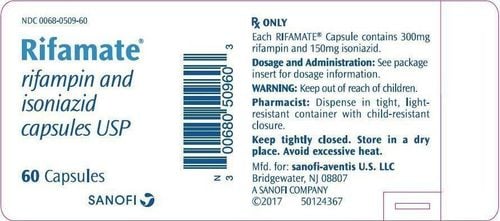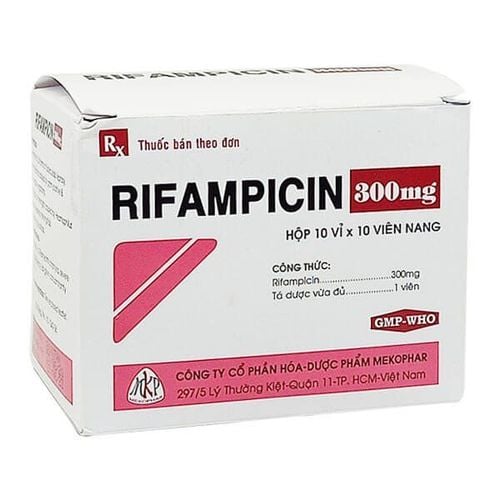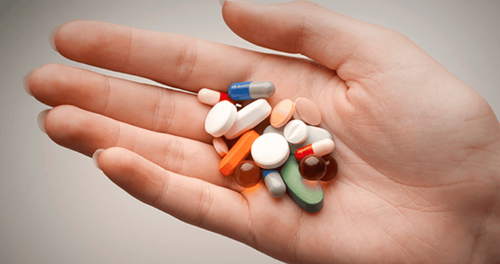This is an automatically translated article.
Medi - Ethionamide containing active ingredient Ethionamide is indicated in the treatment of tuberculosis, leprosy and infections caused by M. avium complex... Let's learn about the uses and notes when using Medi - Ethionamide through the article below.
1. Uses of Medi-Ethionamide drugs
Medi - Ethionamide contains the active ingredient Ethionamide 250mg. Ethionamide belongs to the group of carbothionamides - derivatives of isonicotinic acid. Usually, Ethionamide is used in combination with other drugs in the treatment of tuberculosis, only when other drugs are weakly resistant or contraindicated for use with other anti-TB drugs. The spectrum of action of Ethionamide on strains of M.bovis, M.tuberculosis, M.Kansasii, M.intracellular, M.anvium... The bacteriostatic or bactericidal effect of the drug depends on the drug concentration achieved at the site. infection and susceptibility of Ethionamide to pathogenic bacteria. Scientific studies have shown that Ethionamide acts on the outermost coat of bacilli including the loss of Mycolic Acid.
Medi - Ethionamide is indicated in the following cases:
Tuberculosis: The drug of second choice in the treatment of tuberculosis, used in the treatment of drug-resistant tuberculosis according to a combination regimen of 2 - 4 TB drugs. including leading drugs such as Streptomycin, Rifampicin, Isoniazid, Ethambutol, Pyrazinamide... and second-line drugs such as Cycloserin, Fluoroquinolone, Amikacin, Capreomycin, Kanamycin...; Treatment of infections caused by M.Avium: Medi - Ethionamide is used in combination with anti-tuberculosis drugs or antibiotics in the treatment of infectious diseases caused by M. Avium. However, the drug is easy to cause side effects, so patients need to use it according to the doctor's regimen; Treatment of leprosy: In the past, Ethionamide was used in combination with other drugs in the treatment of leprosy, but now WHO recommends not to use Ethionamide in the treatment of leprosy due to its severe toxicity on the liver.
2. Dosage of Medi-Ethionamide
Medi - Ethionamide is used to treat tuberculosis with the dose prescribed by the treating doctor. Some recommendations on the dosage of Medi-Ethionamide are as follows:
Adults: The recommended dose is 15-20mg/kg/day, ranged from 500-750mg/day (maximum no more than 1g/day). Patients can take the drug once a day if tolerated. In case the patient has digestive disorders, it can be divided into several times a day after meals (250mg/time) every 8-12 hours. The initial dose is usually 250 mg/day, then increased to an appropriate dose on the basis of patient tolerability; Children: The tolerability of children is usually better than that of adults, the recommended dose is 10-20mg/kg/day (average 15mg/kg/day) divided into 2-3 doses. The maximum dose is 1g/day; Patients with renal impairment: No dose adjustment is required in patients with renal dysfunction, patients with creatinine clearance less than 30ml/min or patients on extra-renal dialysis, the dose should be reduced to 250-500mg/day; Ethionamide should not be used alone, but in combination with other drugs in the TB treatment regimen. The duration of treatment is at least 6 months.
3. Medi-Ethionamide side effects
Medi - Ethionamide can cause some side effects as follows:
Common: Anorexia, vomiting, nausea, metallic taste in mouth, increased salivation, diarrhea, postural hypotension, depression colds, psychosis, restlessness, somnolence, jaundice, hepatitis, increased AST, increased serum ALT and bilirubin, muscle weakness; Uncommon: Headache, dizziness, hair loss, gynecomastia in men, hypoglycemia, abdominal pain, optic neuritis, olfactory disturbances; Rare: Peripheral neuritis, epilepsy, paresthesia, tremor, seizures, photosensitivity, rash, stomatitis, purpura, thrombocytopenia. Patients need to stop using Medi-Ethionamide and notify the treating doctor in case of any unwanted effects.
4. Note when using Medi-Ethionamide drug
4.1. Contraindications Contraindicated to use Medi - Ethionamide in the following cases:
Patients with severe liver failure; Patients with hypersensitivity to Ethionamide or any ingredient of Medi-Ethionamide. 4.2. Ethionamide has the potential to cause hepatotoxicity with caution, so the patient's serum ALT and AST levels should be determined before and every 2-4 weeks during drug treatment. In case the patient shows symptoms of increased blood transaminase, treatment with Ethionamide and combination anti-TB drugs should be temporarily stopped until the test results return to normal. Diabetic patients treated with Ethionamide should be carefully monitored because diabetes treatment can be difficult. Blood glucose measurements should be performed before and during treatment. Medi-Ethionamide should be used with caution in patients with depression or other mental disorders. Patients need to have eye exams before and periodically during treatment with Medi-Ethionamide, patients need to notify the doctor if their eyes are blurred or have decreased vision during treatment with the drug. Test thyroid function before and periodically during treatment with Medi-Ethionamide because of the risk of hypothyroidism. Ethionamide is not safe in patients with porphyria. HIV-infected TB patients may reduce absorption of Ethionamide. For pregnant women: Ethionamide is excreted through the placental barrier, causing teratogenicity, so Medi-Ethionamide should not be used in pregnant patients. There are no studies demonstrating the ability of Ethionamide to be excreted in human milk, so treatment with Medi-Ethionamide in nursing women should be based on benefits and risks.
5. Drug interactions
Medi - Ethionamide can cause some of the following drug interactions:
Concurrent use of Ethionamide and Isoniazid may increase the risk of unwanted effects on the central nervous system; The risk of hepatotoxicity is increased with concomitant use of PAS and Ethionamide, so ALT and AST levels should be monitored when the two drugs are used in combination; The risk of neurological disorders is increased when Ethionamide is used with alcohol. Drug interactions occur that increase the risk of effects and reduce the therapeutic effect of Medi-Ethionamide drugs, so to ensure safety and effectiveness in treating patients, it is necessary to inform the doctor about the drugs, foods and medicines. products being used before taking Medi-Ethionamide.
Please dial HOTLINE for more information or register for an appointment HERE. Download MyVinmec app to make appointments faster and to manage your bookings easily.













